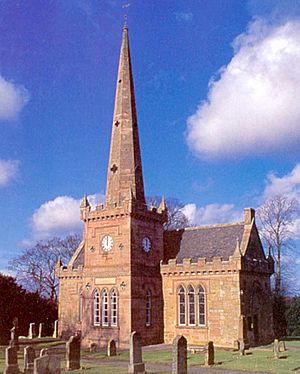William Fletcher (Irish judge) facts for kids
William Fletcher (1750–1823) was an important Irish barrister (a type of lawyer), politician, and judge. He was a member of the Irish House of Commons, which was like a parliament, and later became a judge in the Court of Common Pleas (Ireland). William Fletcher was known for having very strong opinions and expressing them clearly. He cared deeply about the situation in Ireland during his time. A speech he gave to a grand jury in 1814 was very political and caused a lot of discussion and debate.
Contents
Who Was William Fletcher?
William Fletcher was born in Dublin, Ireland. His family's main home was at Garr, near Rhode in County Offaly. His father also owned land in Clane, County Kildare. As an adult, William bought a house in Merrion Square in Dublin city and an estate in Donnybrook, just south of Dublin.
The Fletcher family came to Ireland from Scotland in the 1690s. They were connected to a well-known family from Saltoun, East Lothian, Scotland. This family had already produced two famous Scottish judges: Andrew Fletcher, Lord Innerpeffer and Andrew Fletcher, Lord Milton.
William Fletcher's Early Career
William Fletcher studied at Trinity College Dublin, finishing his first degree in 1770. He then went to Middle Temple in 1776 to study law and became a barrister in 1778. He became a more senior lawyer, known as "taking silk," in 1795.
Interestingly, he also earned a degree in medicine, but it seems he never worked as a doctor. His legal work mostly involved cases about probate (dealing with wills and estates) and admiralty law (laws about the sea and ships).
In 1795, he entered politics and was elected as a Member of Parliament (MP) for Tralee. He served in this role until 1798. In 1806, he was appointed as a judge to the Court of Common Pleas.
The Controversial Speech of 1814
Even though William Fletcher was an MP who sometimes opposed the government, he never caused them much trouble with his speeches. It was actually as a judge that he became known for his strong political views.
His most famous moment was a speech he gave to a grand jury in County Wexford in 1814. This speech, called a "charge," was a fiery talk about all the problems he saw in Ireland. Some of the issues he mentioned were common complaints, like absentee landlords (landowners who lived elsewhere and didn't care for their land or tenants) and tithes (payments to the church that many people found unfair).
More controversially, Fletcher strongly criticized the Orange Order, a Protestant organization. He said that these groups "have produced the most mischievous effects." He believed they were harming justice, and that some magistrates (local officials) influenced by them were not doing their duty fairly.
This speech caused a huge stir! The published version of his speech was printed many times. The Orange Societies were very angry, and a petition was sent to the House of Commons asking for an investigation into Judge Fletcher's actions.
However, Fletcher also had many supporters. One newspaper praised him as "the aged and benevolent judge." Eventually, the controversy died down. William Fletcher continued to serve as a judge until he passed away in 1823 at his home in Montrose, Donnybrook, Dublin.
William Fletcher's Family Life
William Fletcher married Sarah Whitly from Portlaoise in 1780. They had one son, who was also named William.
Their son, William, married Francesca, the youngest daughter of Archibald Hamilton Rowan. Archibald Hamilton Rowan was a famous United Irishman, a group that wanted to reform Ireland and make it more independent. William and Francesca had children. The younger William died in 1845, and his wife Francesca passed away in 1861.
 | Bayard Rustin |
 | Jeannette Carter |
 | Jeremiah A. Brown |


